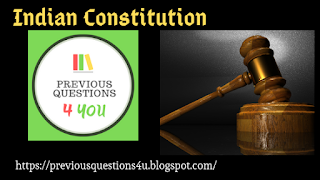Indian Constitution Expected Questions #1| Constitution Rare facts| Indian Constitution MCQ
•What according to Ramsay Muir, the Steering Wheel of the ship of the State’
•Cabinet
•The no of Members in the Rules Committee of the Indian parliament
•15
•Fundamental Duties Borrowed from
•Former USSR
•Second woman to become Chief Information Commisioner of India
•Sushama Singh
•Oath of office of Governor Administered by
•High Court Chief Justice
•Who appoints Advocate General
•Governor
•A minister should become a member of either house of the Parliament within a period of …… if he is not already a member
•6 months
•National Commission or Scheduled castes Article
•338
•Anglo Indian Representative in the Constituent Assembly
•Frank Antony
•Article which stipulates there should be a Council of Ministers with PM as the head to aid and Assist the President
•74
•Amendment that restored the duration of Loksabha and State Assemblies from 6 years to 5 years
•44th
•Who represented Parsicommunity in the constituent assembly 1stmeeting?
•H P Modi
•Proclamation of Financial emergency has to be approved by Parliament within …..
•2 months
Check These also
Job News
Exam Preparation
•Thank you..










![[Set 3] MCQ for ICDS Supervisor Exam|ICDS Supervisor Kerala PSC](https://blogger.googleusercontent.com/img/b/R29vZ2xl/AVvXsEirmpde6UGlx94eDLtWkrJ18PAc_d8GVw_K-4E1izTltkjugPJEyBVplbm_S85f0gxNowfcbT6afCPnAjTF0_TKYK9Lq7zm1fnQU-TPsKEosx0opg5d05b-nry5qBPrKUZMoVD7BOFpW-5jxoAlMCTysmHKi30ieam3tPtA_ohH_Z5D2Uu1PPxt-qZ38wY/s72-c/icds-supervisor-mcq.jpg)

![[Solved paper]Assistant Engineer Agriculture Kerala PSC Previous Question Paper|Assistant Engineer Agriculture Kerala PSC Question paper 665/2022](https://blogger.googleusercontent.com/img/b/R29vZ2xl/AVvXsEiE5XMCyjBp5qgQ6gc1f5YxnObTDPt4ioa1TM0DhzIzBsKfJUJZg1nhfOcliABQCpnIj9INlw2xliBzlEEPCd_tgUhxvJhySogAkZFGKaWZ9GujHt4KwM-DSmOLBbLLlexxurubFQobMSgo11YP_2eVKCTrV0CWiwOlouEr1abUj5m6V5fJomuMxLK5U5o/s72-w640-c-h360/Assistant%20Engineer%20Agriculture%20Kerala%20PSC%20Previous%20Question%20Paper.jpg)
